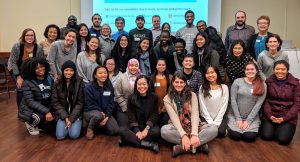The benefits of just one person cultivating peace and compassion may have a cascading impact

Reading and listening to the daily news, often covering wars, conflicts, catastrophes, disasters, can be disheartening and cause increased anxiety and depression. Unsurprisingly, data suggest that a majority of Americans feel exhausted and hopeless when they think about politics and their future. Some psychologists have argued that Americans suffer from a sort of learned helplessness—the sense that nothing they do will make a difference—from hearing about violence such as mass shootings. People say that they feel the pain of events in the news cycle but see themselves as powerless to stop them.

In terms of coping with these events, meditation could help in more ways than one. The power of meditation for cultivating personal well-being is hardly a secret. For more than 20 years, neuroscientists have been documenting how mindfulness meditation can help people cultivate calm and improve their mood, among other benefits. Some recent research suggests it can also help people experience deeper psychological transformation, allowing regular practitioners to reach important insights about themselves and their world.

But there’s another consequence of meditation that people do not always anticipate. Despite the ways in which wellness movements have emphasized a highly individualistic way of thinking about meditation and self-care, meditation can also help care for and support others.
When one person takes the time to regularly be still and attend to a specific cue, such as their breath, a prayer or mantra, their practice can have spillover benefits for the people around them. It’s an idea that several studies have explored to date and one that dovetails with recent investigations into what scientists call the social ripple effect, or the idea that one person’s behavior, mood or attitudes can spread throughout a community. It is also a potent reminder of how bringing a spirit of calm and compassion towards oneself may translate into something beneficial to those around us.

Some meditators propose that if enough people had a regular practice, the result would be a world enriched with calm and compassionate people. And there’s science to support that idea. Research demonstrates that people who meditate show increased positivity toward others. For instance, training in meditation is linked to increased sensitivity to and engagement with human suffering and an increased tendency toward altruism. Similarly, meditation interventions aimed at increasing kindness are associated with reduced bias toward numerous “others,” including ethnic out-groups, people experiencing homelessness and people who face stigma because of their weight.

So why might one person’s meditation practice benefit the people around them? There are many plausible mechanisms. For one, as meditation trains participants to be aware in the present moment, it may promote sensitivity to others’ perspectives and emotions. Another possibility is that we sometimes dismiss others’ pain because it will cause us discomfort—but meditation can help practitioners better cope with negative emotions, making it less painful to engage with and respond to others’ suffering. In line with these ideas, researchers published findings in 2023 that showed that meditation increased people’s concern for the suffering of others—and that, by comparison, people without this practice were more oriented to their own distress.
Meditation may also help people develop strong interpersonal relationships. The practice may leave people in a better mood overall and build up their emotional control, both of which could improve their interactions with others.
Last spring a study that compared 47 physicians who were trained in meditation with 47 who did not have this training found that doctors in the meditation group were less anxious about communicating with their patients and reported having more trust in others. Critically, the meditating participants were also less likely to practice defensive medicine, in which doctors make health care choices based on fear of litigation instead of best practice. The higher-quality social interactions that emerged with meditation training seemed to improve doctor-patient interactions and ultimately the care that doctors provided to their patients.

It’s possible that the meditators’ improved relationships and interactions have even broader benefits. Research on a phenomenon called the social ripple effect suggests a person’s attributes can spread through and beyond their social network. Although social ripple studies have yet to explore meditation, it’s possible a similar phenomenon occurs. Some experienced meditators have argued that cultivating a state of compassion in oneself helps us bring that attitude toward others. Perhaps, in turn, they pass some calm and compassion along too.

Whatever may be at play, the science of meditation’s social consequences are heartening. Often, the challenges of the world can feel overwhelming, and one person’s actions may seem to make very little difference. But this research is a reminder that when we improve our own well-being, we can also improve the lives of others.

The benefits of just one person cultivating peace and compassion may have a cascading impact.
By Gilbert Castro | ENC News


































